#not overly sexualized by the narrative. fills a role in the story that would usually be filled by a man.
Explore tagged Tumblr posts
Text
say what you will about metal gear women but the single solitary time i have ever seen two butch women in a canon relationship in any work of fiction ever was peacewalker
#strangelove is like. 7/10 lesbian rep but ONLY because they made her be a creep sometimes#i mean its like. about as creepy as some of the metal gear dudes are but nonetheless#THE BOSS though?????#all ive ever wanted out of a video game women 17/10 no notes whatsoever#not overly sexualized by the narrative. fills a role in the story that would usually be filled by a man.#all the soldier dudes that work for her are clearly terrified of her. she can curl 200 lbs#and she was even in a codependent homoerotic situationship with another woman..#playing mgs3 i was like Girl. how did you end up in a kojima game
67 notes
·
View notes
Text

War Wounds by silentauror
Harry/Draco, Harry/Ginny (2007, Explicit, 30k)
Some wounds take longer to recover from than others. This is a story about finding the way forward. Themes of alcoholism, dubious fidelity, and a love triangle.
“Since when I do matter so much to you?” Malfoy made an impatient gesture. “That still confuses me.”
“I don’t know,” Harry said. “I just… there are certain things that you expect to be the way they are in life. I expect Hermione to know stuff. I expect Ron to be up for a pint when I want him to be. I expect the Ministry to be bureaucratic and riddled with politics. I expect you to be confident, full of yourself, snarky, and good at everything you do. I want you to be that way.”
I can’t remember the last time I read anything that wasn’t on AO3 - I’m too used to it by now! - but I felt like doing a silentauror marathon and since most of her works are on LJ I decided to explore a bit. I’ve been reading a lot of older fics since coming back from my fandom break, I think looking for some nostalgic emotional resonance. And while alcoholism and infidelity are topics I usually avoid in fic, interestingly enough those tags were exactly what made me click on it. I know this is the kind of content that would make me jump into it back in 2007 and I’m so happy I gave this a chance in the name of nostalgia because this was the lovely, heartfelt and cathartic ride I needed. I must preface this clarifying that this fic is told from Harry’s POV and focuses heavily on the infidelity theme (his conflict) rather than on the alcoholism theme (Draco’s conflict). I feel like between the two, the latter gets an overly simplified resolution that some people might find disappointing, so keep that in mind before diving in.
One thing I love about older fics and especially silentauror’s works is how well they capture the war’s dark, urgent and haunting atmosphere. We often see characters being given space to be more damaged, snappy and introspective than usual, silently fighting personal demons before asking for help. This happens to be a post-war fic set ten years after the Battle but for those who love war time / spy fics like me, I highly recommend checking SA’s works where the war drags on for years. Those are so raw and tense! Personally I love how the serious tone note permeates the narrative and allows characters to be complicated, angry, lost and vulnerable. War Wounds captivated me right away with a quiet but poignant slow burn bringing together this sassy yet broken and incredibly lonely Draco, and this weary Harry who settled for a life that doesn’t bring him any joy and finds himself caught in Draco’s orbit because he’s the one who cares. Oh boy, their dynamics are electric but also quietly soft in its tentative friendship. I almost didn’t want them to get together because I looked forward to every bit of dialogue, every moment of silent understanding where they bonded over shared trauma.
Draco’s voice took my breath away - I don’t know how SA managed to balance his sharp tongue, vulnerability and long-standing want for Harry in such a brutally honest way. He’s snarky and seductive, a badass potions expert that renders Harry frustrated in his bi disaster crisis because he can’t understand how Draco could be anything other than confident smooth and absolutely in control. And this oblivious Harry is equally lovely, jaded about his work, full of insecurities watching his relationship with Ginny ruin, confused and irritated and curious about the way Draco makes him question his sexuality, but never abandoning him on his own. As many “sexual identity crisis” stories Ginny fills the role of wrong person / bad guy but despite the amount of stories exploring this trope, this fic still feels very fresh and unique as if the author is writing a love letter to Drarry.
This fic is also intensely cinematic. So many special moments will stay with me, like the way Draco confronts Harry about keeping secrets (I love his ultimatum “if we’re going to be friends let’s cut the bullshit and talk things through”) or when Harry feels a lump in his throat seeing Draco in the rain, or their early conversation about Draco liking unavailable things, and of course the beautiful way they come together at last, intimate and understanding, Harry finally sure of his feelings and experiencing all the things that for whatever reason he never got to experience with Ginny. I found their certainty about each other really touching, yet nothing prepared me for that “This is going to be good, Harry”, I could actually feel my chest bursting with emotion. I hadn’t felt this moved by a fic ending in ages!
If you’re looking for a quietly gorgeous, mature, realistic and slightly angsty post-war romance search no more, and while at it make sure to check SA’s full catalogue, you’re in for a treat!
Read on AO3
74 notes
·
View notes
Note
I have a character who is trans, and I want to make sure I write him properly and as a real person without succumbing to stereotypes. So I was wondering if any of you would be willing to make a list of the most common and/or incorrect stereotypes about trans people? I know it's a lot to ask, and I totally understand if you don't have the time. But you don't know if you don't ask, right? Thanks!!
After a fruitless attempt to find a list for you I have come to conclusion that I’m just gonna have to write one myself… so please forgive me for the disorganised mess this is going to be, I’ve been digging around the internet grabbing whatever I can find. I’ll link to articles whenever I can, and some of these tropes don’t have names yet or have been named by me and the other mods. Also some are beliefs but people apply them to trans characters too. Lets go!
Notes: I’m going to add FIM (fine in moderation) to the ends of tropes that are perfectly fine, but are overused (given the very small amount of transgender representation, these tropes became big problems very quickly but aren’t harmful individually - or at least some parts aren’t)
Bury Your Gays/Punish Your Gays - (here gay is used as an umbrella term for any characters in the community) this trope is where LGBT+ characters are killed or punished and given no chance of a positive future for simply being in the LGBT+ community
Trans Tribulations - this is basically where characters are miserable because they are dealing and facing others transphobia or misconceptions or their own gender dysphoria (FIM)
Forcibly Outed and The Great Trans Reveal - this is where either another character forcibly outs a trans character to others, or when their transness is found out without their consent/forced consent (for example: someone walks in on a trans person while they’re changing to see them wearing a binder or possible even nude, or when a character is injured and when trying to save them others they find out they’re trans.)
Villainous Trans or Gender Non-Conforming Folks (link contains sensitive material) - this is pretty self explanatory, it’s villains who are either coded or explicitly trans and their transness is large part of why they are villainous (and often “creepy”). They’re often made to be predatory and violent
Trans Folks As Victims / Tragically Trans (same link as above) - those poor tragic trans folk who are ostracised, brutally murdered, and forced into poverty/sex work but screw doing anything to actually help them! (this appears a lot in crime dramas)
Not Truly People - when trans/nb characters aren’t treated as real people or are treated as caricatures or objects
Cis Is Better - the belief that being cis is better than being trans/nb so trans/nb folks all obviously want to be cis
Trans Since Childhood - the belief that all trans folk have known they were trans since childhood/got the opportunity to transition at a young age (FIM, some trans people do know since childhood but not all. Some people are figuring this out in their 60s, they deserve as much respect and representation as young trans folk)
Trans = Gay - trans people aren’t really trans they’re just gay and have internalised homophobia! (sarcasm)
The Knowledgeable Ally - this cis ally knows everything to do with trans folk, in fact they know even more about being trans than trans folk do! They kindly share their bottomless knowledge and are always there to correct trans folk. In stories these brave heroes are often at hand to take transmen by the hand and tell them how terrible it is to ace bandage and give them a binder (that despite them not measuring them fits perfectly) and show them a better way to be trans (people should absolutely not use ace bandages to bind but it’s the patronising nature in which this is done that is the problem)
Trans = Gross / Trans Is Misleading - the “I was gonna get with this hot chick but then it turned out she had a penis and I started puking!” thing, apparently it’s supposed to be funny?
TRIGGER WARNING FOR NEXT TROPE
Predatory Trans Women / Invading Trans Women / Trans Women Are Predatory Men (straight or gay) - the belief/ rhetoric that trans women are straight men who want to invade lesbian spaces to to rape cis lesbians ( and to turn them straight). Or that trans women are gay men who want to rape straight men
END
Delicate Trans Boy - the “trans boy are soft and delicate” or “boys-light” thing, it’s basically where people infantilize and fetishise trans guys. (FIM - other than the infantilizing and fetishising thing, don’t do that). These characters frequently can do no wrong or their wrong doings are glossed over/ignored
Trans Guys Are Either Super Masculine or Super Feminine - no in between (FIM - this may be because of societal pressures, please do explore)
Trans Women Are Either Super Feminine or Super Masculine - no in between (FIM - this may be because of societal pressures, please do explore)
Transmen look extra feminine / Transwomen look extra masculine - this is done to establish their non-cisness/show how abnormal trans people are, transmen are all super curvy and soft and all transwomen are all very tall and very hairy ect. This is separate to the above tropes because this is usually used when fetishising trans people and is often done to other trans people from the “normal” cis people
Only Skinny White People Are Trans/NB - our media pretty much only includes trans/nb folks as skinny white, androgynous or hyper masc/fem people. This is beginning to change, but slowly
All Trans Women Are Overly Sexual - a side affect of the Predatory Trans Women trope (this is most likely linked to A Man Is Always Eager and the misconception trans women are men) as well as the fetishisation of trans women
All Trans Men Aren’t Sexual / Are Asexual - it’s an extension of the Delicate Trans Boy trope (most likely linked to the All Women Are Prudes (don’t want to or have interested in sex)) (FIM, there are asexual/non sexual trans men)
Trans Women As Sex Workers (link contain sensitive material) - the most common occupation for trans women in media is sex work, it’s heavily linked to the fetishisation of trans women and to Trans Folks As Victims
Easy Sex Change - the myth that transitioning is one quick surgery away when in reality it can take years, several surgeries, and HRT (assuming the person wants/can transition medically)
Trauma Made Me Trans - the idea that people are trans because of a trauma they’ve suffered, or because they didn’t get enough attention when they were young
My Parents Wanted A Boy/Girl So I Became One - when characters are trans because their parents wanted a kid of another gender and the character wanted to make them happy
“Trans” For Love - when a gay character pretends to be of another gender (sometimes even transitioning) so they can be openly affectionate/love their partner, or when a character pretends to be of another gender (sometimes even transitioning) so their love interest will be attracted to them. (if I’d seen this only once it would have been to many, but no, I’ve had to see it multiple times. do not.)
Love Heals Dysphoria - (the trans version of Love Heal All) It can help some people but doesn’t eradicate dysphoria (unfortunately)
Born In The Wrong Body (narrative) - I don’t have enough space here so here’s a short article explaining the problems with this and a quick quote for those who don’t want to read it “I am not trapped by my body. I am trapped by your beliefs. And I want to reclaim this body from those who want it to breathe and be fed by their dogmas”
Trans = No Body Confidence - when trans characters have absolutely no body or confidence in their appearance what so ever. This is often used with The Knowledgeable Ally and Love Heals Dysphoria, in this scenario the trans character is filled with self hate and lacks any kind of confidence what so ever until their cis friend decides to take pity on them and helps them over come all their confidence/trans related problems (in a very patronising way)
“Required” Medical Transition - the belief that trans people need to undergo surgery/surgeries and HRT in order to be trans or to be their gender. This and it’s problems are very heavily linked to Born In The Wrong Body and Cis Is Better. Here’s an article which covers this and a quick quote “mainstream discourse has viewed cis-gender embodiment as superior and ‘correct’ […] it is as if you are not done until your body looks like a cis-gender body!”
All About Trans - this is where the whole story is focused around being trans, sub-plots included (while there is a place for trans centric stories, there’s more to us and our lives than just being trans). Or when a trans characters whole narrative/development is centred on them being trans
Trans Folk Must (Want To) Adhere To Gender Rolls - no one must adhere to gender roles, trans folk aren’t exceptions
Old Friend, New Gender - while this trope seems innocent enough it’s often coupled with Trans = Gross / Trans Is Misleading. This is typically played out with a cis male who meets this strangely familiar super model looking women who he’s interested in, only to find out she used to be one of his old (”male”) friends. From here we go one of two ways, first the “omg she’s actually a man” repulsion where we’re supposed to find it funny/gross that he was attracted to trans women. And the second is where he has the same reaction but this time, it’s still played for jokes but, there’s a blatant message of acceptance/tolerance and he stops being attracted/interested to her but he accepts her as a women and as his old friend (this is typically handled terribly)
This is a fairly sizeable list, but by no means a comprehensive one.
Please do reblog and add trans/nb tropes and trends as well as links to lists by others!
If you have any questions or would like us to further elaborate on any of these tropes or any other trans/nb tropes, please send us an ask (when the ask box is open).
- Mod Emery
684 notes
·
View notes
Text
Episode 17: Before the Storm

January 797/488. As the Yang fleet settles into their new home on Iserlohn, Reinhard (and Oberstein) concoct a scheme to keep the Alliance out of their hair while they’re busy seizing power: plant a bitter, drunken, disgraced Alliance commander among two million prisoners of war they offer to exchange, armed with a sheaf of paper outlining apparently foolproof instructions for instigating a military coup d'etat. Despite immediately seeing through this plan, Yang can’t stop the exchange, so has to content himself with confiding his suspicions to Bucock. Kircheis visits Iserlohn to conduct the prisoner exchange, filling the fortress with dangerous levels of sexual energy, as literally no one (except Yang) can shut up about how hot he is.
Julian Explains It All
Can you believe it’s been a whole year since we started? Well, a year in-universe that is: It’s January of UC 797, a year since the Battle of Astate; and for no one is the passage of time more exciting than Julian, who at the age of almost-fifteen-thank-you-very-much is soooo much more grown up than the babyfaced thirteen-year-old we first saw making Yang tea back in episode 3—or so he is eager to believe.

“I’ll be fourteen-and-five-sixths later this week, Kircheis-kakka!”
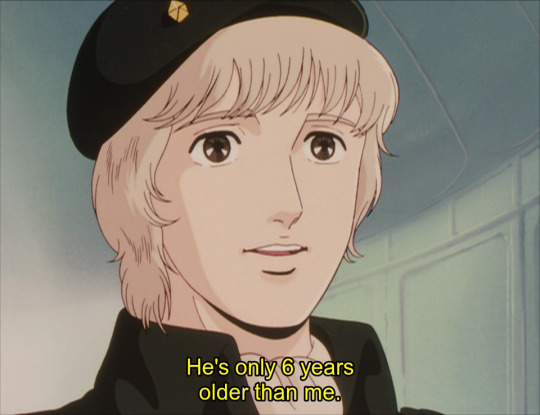
This line and the line above deftly show Julian’s impatience to project himself into the future; the amazingly grown-up second in command of the entire Imperial fleet is after all not *so* much older than him.
Having talked his way into coming along to Iserlohn, Julian now has the official rank of gunzoku (軍属), “civilian in military employ” (if anyone knows a better/less clunky translation of that, let me know!), and gets to do important military things, like…

...taking marksmanship lessons from the leader of the Rosen Ritter—sweet, that’s pretty badass!—and...
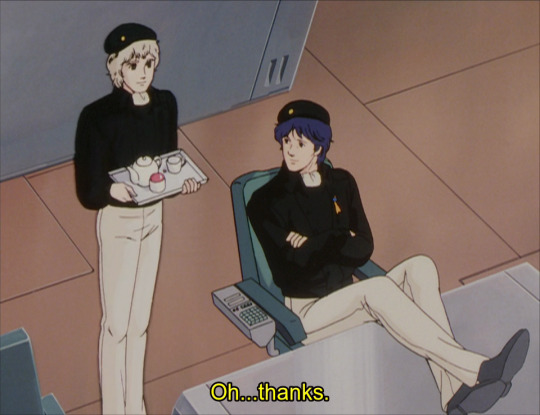
...uh, right, also still making Yang tea actually. Of course.
Julian keeps a diary for the first several months of his time on Iserlohn, written by Tanaka as one of the side stories to the novels; and in fact some of the dialogue in this episode comes from that diary rather than the novels themselves. While of course the stories are not Official Icebergs Canon, episode 17 is the only Alliance episode that takes place fully during the time span of the diary, and Icebergs-canon or not the diary is too fucking adorable for me to resist peppering this post with quotes from it. It’s never been officially translated into English, so all translations are by me.
On Yang
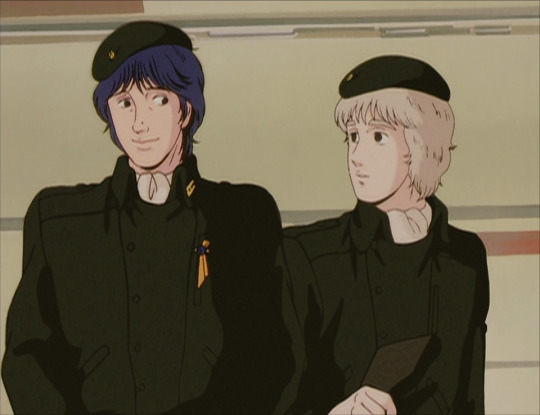
“I accidentally only wrote about Yang so far. I should write about myself a bit.” —Julian’s Iserlohn Diary, first entry, p. 12
Julian’s world revolves entirely around Yang. This has never been subtle: From the way he styles his clothes and body language to exactly match Yang’s, to his desire to emulate him by becoming a soldier, to his expression literally every time he looks at him, Julian’s idolization of Yang has been clear from the moment we first saw him.

As Elizabeth mentioned, Julian wears his heart on his sleeve; his expressions are almost always a clear window into his emotions, especially in a shot like this where no one is looking at him. That tiny smile as Yang grumbles about the party they just fled conveys so much affection.
The beautiful thing that happens when you stop relying on narrative shortcuts to define relationships is that the variety of different relationships you can depict blossoms into an infinite array. Julian and Yang’s situation certainly seems to defy simple description: Yang is Julian’s legal guardian; but as I’ve discussed, the language and affect Julian adopts around him are more those of an official subordinate of some kind than family, and indeed in his diary Julian uses words like “orderly” (従卒) or “disciple” (弟子) to refer to his role in Yang’s life. Between the two of them, Julian is both the caretaker and the protector: In episode 10 we saw him try to sooth Yang’s sour mood with tea, as well as rush to defend him physically when he’s attacked.

This gif will absolutely never get old.
Now that Julian’s older and stronger and discovering a talent for physical combat that Yang completely lacks, he’s even more eager to officially take on the role of protector/bodyguard. But there’s an awkward mismatch between Julian’s sincere desire to play this important (and adult) role, and Yang’s very “aww how cute” reactions.

Julian's aspirations get no help from the fansubbers' choice of translation for koitsu; I'd go with a simple "you..." here personally.

This “go keep watch” gimmick is so transparently a way to get rid of Julian for a few minutes that the seriousness of Julian’s nod breaks my heart a little.
Julian’s worship of Yang at this stage of his life is many things: overly intense in that way that emotions are at the age of I’ll-be-fifteen-this-year; more than a little unhealthy; and totally adorable. It’s unclear right now whether Julian himself sees his feelings as a crush; given his general lack of self-consciousness about it, my read is that he doesn’t. But it’s the sort of proto-crush/obsession that could easily become romantically tinged as he continues to grow up.

"Yang sucks at 3D chess." —Julian’s Iserlohn Diary, p. 68
On Frederica (...and also Yang)
As we follow Julian around Iserlohn early in the episode we find him accosting Frederica while she’s washing dishes, which means it’s time to introduce the Yang-Bechdel Test! Elizabeth has been using the Reinhard-Bechdel Test to measure whether Kircheis ever actually thinks about Annerose without simultaneously thinking of Reinhard (spoiler: he does not). Along the same lines, if we put Julian and Frederica in a room together, it’s not hard to guess the topic of conversation to which they will gravitate.

Here Julian seeks Frederica out to pick her memory about the events nine years ago on El Facil that launched Yang into his uncomfortable position of fame, and they end up giggling together over Yang’s lack of commanding presence, and speculating on how his life would have gone if he hadn’t become famous.
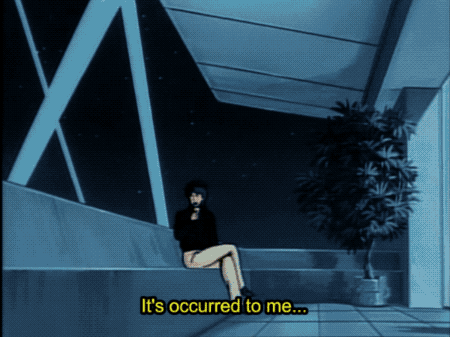
Like other El Facil flashbacks, this was redrawn for the DVD version to deny us this amazing vision of Yang choking on a sandwich. (Julian is speaking here.)
Bonding with Frederica by discussing Yang serves multiple purposes for Julian: He gets some insight into Yang’s past, since she met him many years before Julian did; and like his interest in Yang’s plans with Jessica in Thernusen, it lets him keep an eye on Yang’s potential love life. The friendship between Julian and Frederica is very sweet, but we’ll be continuing to keep track of how often they actually pass the Yang-Bechdel Test.
On Kircheis (and Dusty) (...and also Yang)
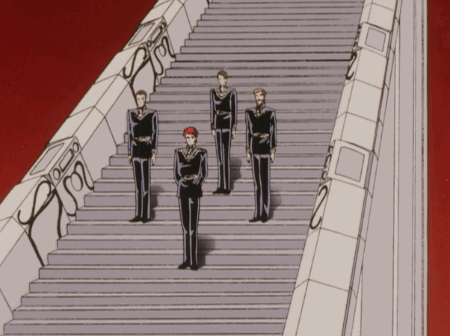
“The person standing at the front looked astonishingly good in the splendid Imperial uniform of metal on black fabric. He seemed about 30cm taller than me, towering above everyone else. Under his unusually red hair, his youthful face was both handsome and gentle. This was High Admiral Siegfried Kircheis.” —Julian’s Iserlohn Diary, p. 181
The Main Event of this episode is the prisoner exchange, the first direct contact we see between the Empire and the Alliance where no one is shooting at each other. From the moment Kircheis steps off of the Barbarossa (which must be making all the Alliance ships in the dock feel rather bad about themselves), all anyone in the whole fortress seems able to talk about is how attractive he is, starting with Dusty’s not-so-subtle dreamy gaze:
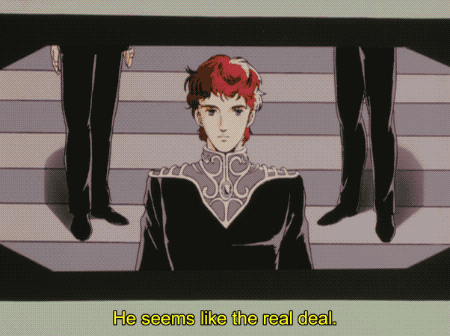
Along with Julian, Dusty’s expressions are usually quite transparent. Here he reacts to the other admirals’ shock at his mooning over an enemy commander with deflection, but come on. Dusty. We saw you.
After Julian and then Frederica both comment that Kircheis is super handsome, even Poplan and Schenkopp get in on the discussion, in an exchange the anime team felt was important enough to snag out of the diary.

“It may have been an attempt at modesty for Poplan that he didn’t say not as good-looking as himself. Perhaps due to their age difference, what Schenkopp said was more shameless.” —Julian’s Iserlohn Diary, p. 183-184. (Nah Julian, it’s just that Reinhard is so hot that even Poplan’s comfortable admitting it out loud.)
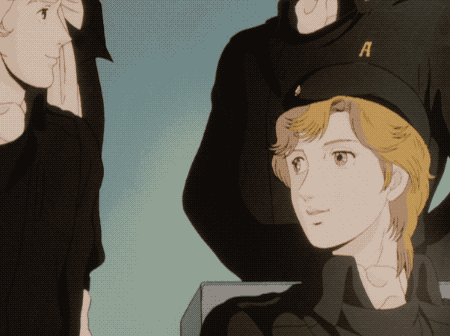
Okay to be fair, here we also see Julian and Frederica bond over how handsome Kircheis is and uh, how gay Poplan is...I guess that passes the test?
At the actual ceremony, a collection of NPC officers get in on the fun of staring in awe at Kircheis, but of course Julian and Dusty have front-row seats.
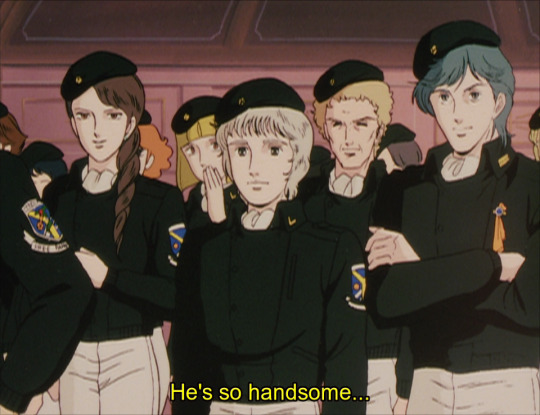
In a small-scale version of the technique we’ve seen before of drawing parallels to heteronormative relationships, the random women whispering in the background are repeating almost verbatim what Julian and Dusty both said just moments ago; we’re even focusing on Julian and Dusty in the foreground of the shot, as they gaze up at Kircheis. We get it, anime team, sheesh.
On his way out of the room, Kircheis notices Julian and speaks to him, or in Julian’s own words…

“As High Admiral Kircheis, who had been saying something to Admiral Yang, was exiting the room, the gaze from his blue eyes suddenly rested on me. He had a pleasant, kind voice. [...] I worked hard to keep my voice calm.”
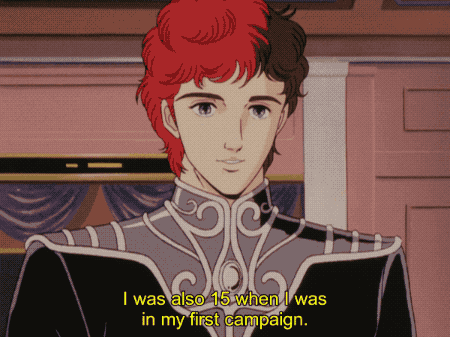
“With a smile, High Admiral Kircheis turned his tall figure and walked away from me. I stood for a while in a daze. I couldn’t believe the second in command of the enemy fleet actually talked to me.”
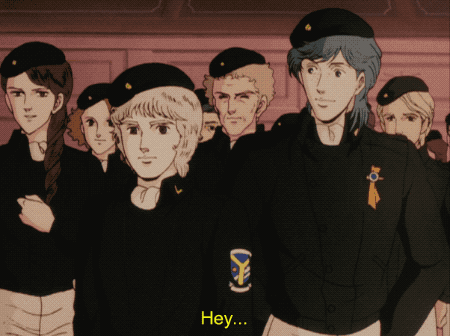
“I felt strangely unsteady below the knees, like I was standing on a floor made of jelly. If Admiral Attenborough hadn’t pushed my shoulder, I might have just stood in the emptying assembly hall forever.” —Julian’s Iserlohn Diary, p. 182-183
I’m supposed to be doing incisive, below-the-surface analysis here, but the anime team made my job pretty pointless in this case. Even without the diary commentary, between Julian’s dazzled expressions and Dusty’s blatant teasing, there’s nothing to say here except that I agree guys: Kircheis is uhh, the real deal.
But if you’re worried, like Dusty, that Julian’s loyalty might actually be tested by his newfound infatuation, fear not; at the end of the day, Julian knows where his real affections lie.

“Anyway, isn’t everyone forgetting our own representative? Admiral Yang isn’t as dashing as High Admiral Kircheis, but his completely natural, unforced manners and expressions were really charming. [...] Even if Admiral Yang were to come face to face with Marquis Lohengramm, he would calmly maintain his composure and his own pace. I’m sure of it. For me, Admiral Yang is number one, always. So what Admiral Attenborough said when he pushed me, umm—I’d called it a ‘needless anxiety,’ totally impossible. Although, if Admiral Yang himself defected, that’s a different story.” —Julian’s Iserlohn Diary, p. 184
The Secret World of Paul von Oberstein
Meanwhile on Odin, bathed in dramatic sunset hues streaming through arched columns, Oberstein continues to find that (for some reason he still can’t entirely fathom) Reinhard’s treatment of Kircheis is the one topic on which his opinion is not welcome.

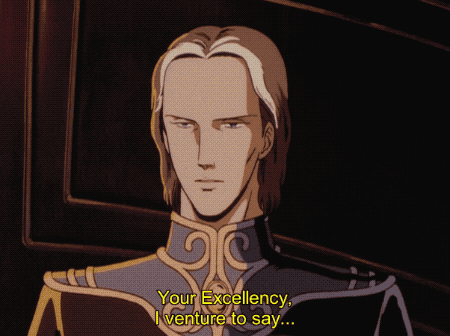
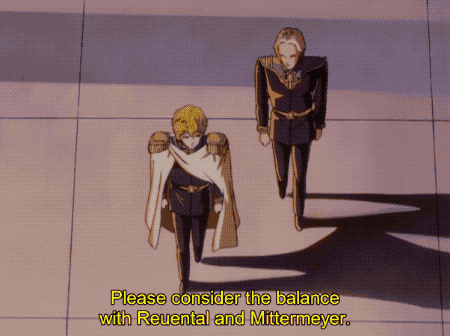
Echoing their very first interaction, in which Reinhard refused Oberstein’s request for Kircheis to leave the room (until Kircheis himself offered to comply), here Oberstein suggests that promoting Kircheis to second in command creates too much inequality among the admirals. Ever the utilitarian, Oberstein believes in using each person in the most logical and expedient way; promoting Kircheis above the other admirals, especially when Kircheis is clearly displeased with some of their recent strategies, goes against his sense of order.
Until now, Reinhard has held onto the belief that he can use Oberstein’s Machiavellianism to accomplish certain goals, while simultaneously maintaining his privileged working (and otherwise) relationship with Kircheis. But this is a delicate balancing act—Oberstein is less willing to drop his objections to a “number two” position among the admiralty than Reinhard anticipated, and Kircheis’s discomfort with Oberstein’s methods hasn’t abated even after the demonstrated success of Amlitzer.
Not surprisingly, it’s Oberstein who finally pushes Reinhard to snap and finds himself on the receiving end of some harsh words. Reinhard still doesn’t give in to any of Oberstein’s Kircheis-related demands, but his nerves are visibly frayed, and it’s clear that the fragile peace between the three of them can only last so long. Because this is LoGH and things are never simple when they can be headache-inducingly nuanced, Reinhard isn’t on his way to a trite “choose him or me” ultimatum—but there’s no doubt that he can no longer ignore the ever-widening chasm between his two closest advisors.
Stray Tidbits
The worldbuilding at the beginning of the episode is amazing, showing us around the many sides of the giant floating sphere that is Iserlohn. The fortress holds three million civilians, which is kind of weird—was there continuity in those civilian communities even as the fortress changed hands from the Empire to the Alliance? ...In any case, the “Gone with the Sun” movie poster is one of my favorite random background details. I also like how we get to see the main control room still under construction.


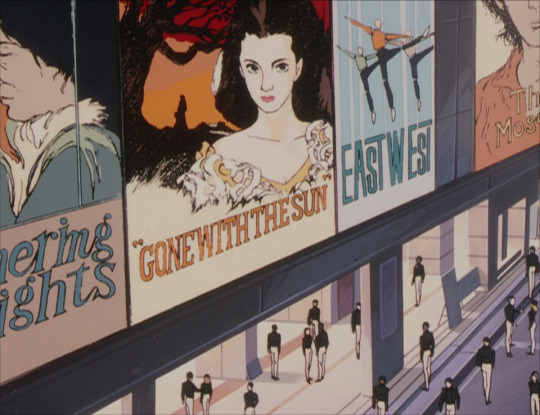

Julian, dear, you know I love you, but what in god’s name are you wearing? Is that like, a light purple sweatsuit? With a blue and yellow jacket? I support your fashion experiments but this one is a miss.
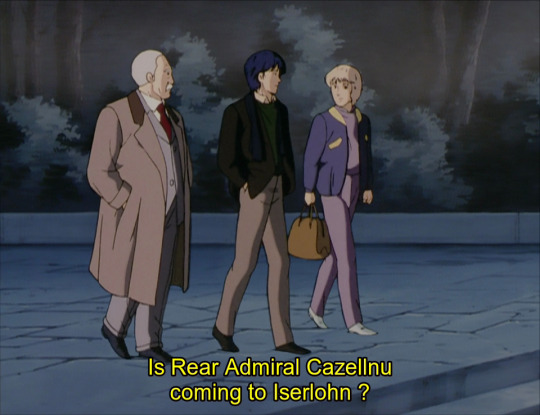
Keep the bag and shoes though, they’re working.
Yang reacting to coffee is everything. *shakes fist at DVD remasters*

“There is no coffee in our house. Even if we have guests who are on team coffee, Yang just gleefully makes them drink black tea.” —Julian’s Iserlohn Diary, p. 70
Yang and Kircheis interacting in person is a breathtaking moment, for the audience as well as for Julian. Reinhard and Yang have clearly admired each other as tacticians from the start, but Kircheis brings a more personal angle, actually articulating a wish that they could have been friends. Hmm do you think maybe this show thinks war is…...bad?

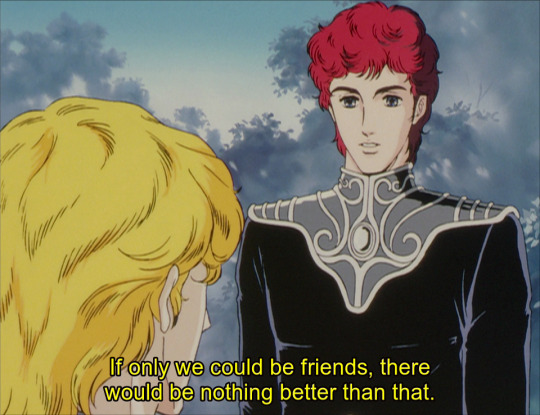
You need this Schenkopp gif in your life.
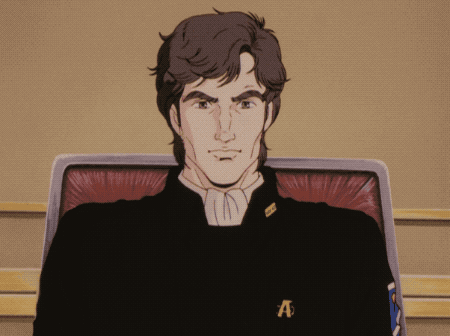
#Legend of Galactic Heroes#Legend of the Galactic Heroes#author: Rebecca#Alliance#Iserlohn#Julian#Yang#Frederica#Dusty#Kircheis#Oberstein#Julian's Iserlohn Diary#Yang-Bechdel Test#real deal
30 notes
·
View notes
Text
Gender and Sexuality Portfolio Post Four: Connection to Popular Culture
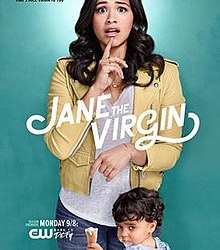
Jane the Virgin: Revising the Binary
The goal of this assignment is to search how TV shows, movies, comics, songs, etc. depict stereotypes and gender roles of Latina women in popular culture. In addition, the goal was to also explain how the artifact chosen either retells, revises or rewrites the binary. From the very beginning I knew I wanted to focus on the Latino community since I, myself am a Latina. I thought about focusing on Latina women in the workplace and analyzing the show, Ugly Betty but it wasn’t a topic that I really connected with. I chose to focus on how Latina women are portrayed in the media and after thinking about it, I decided to look into Jane the Virgin. I picked this artifact because I know that it is a show in which the main character is very family oriented and the storyline is based on the life of a young Latina woman who faces a variety of difficulties such as family expectations, family issues and an unplanned pregnancy. I also know a lot of people who have seen this show including my friends, my sisters, my mom and myself. To provide a brief summary about the show, it is about the life of a pious, hard working 23 year-old Latina woman who is artificially inseminated by accident. This life changing event changes her timeline and the way she had her life planned out. The show, Jane the Virgin revises the binary by destroying Latino stereotypes and challenging expectations that are placed for women in society.
After getting artificially inseminated by accident, Jane is questioned by her family about her promise to stay a virgin until marriage, including her grandma, Alba, who is very passionate about God and Jane. Alba has always been very strict and straightforward with Jane, especially when it comes to her virginity. She gives Jane a white flower and says to her, “look at the flower in your hand Jane. Notice how perfect it is. How pure. Now, mija, crumple it up. Crumple the flower Jane.” After doing so, Alba tells her to try to make it new again but Jane is unable to do so. Very satisfied Alba tells her, “that’s right. You can never go back. And that’s what happens when you lose your VIRGINITY. You can never go back. Never forget that, Jane.” This first scene is very important because it plays a very important role in the life of Jane throughout the show, especially because she has been in a relationship with her boyfriend, Michael, for over two years without any sexual relations. As the audience, we can tell that even though she feels the pressure that as a woman she has to sexually please her boyfriend, she decides not to abide to these expectations. Instead of abiding to these expectations she focuses on her education and the goals she has set for herself. Doing so, encourages the audience, to ask questions such as is the binary useful? Is it appropriate? According to chapter five of Gender Stories, “such questions revise the binary by raising questions for the audiences about the system in which they have been participating” (121). Jane’s commitment to staying a virgin and not allowing herself to fall under these expectations and pressures as a sexual being helps the audience criticize how women (Latina, white, or black) are portrayed in the media, as overly sexualized.
As I mentioned above, Jane’s boyfriend Michael, plays a significant role in Jane’s life. Although, as he says, he would love to have sex with her he still respects her decision to save herself until marriage and that’s something that Jane loves about him. In episode one, Michael proposes to Jane before finding out she was artificially inseminated on accident. As soon as he finds out he backs out and explains to Jane that he can’t be with her if she decides to have ‘it” because it is not his child. When Jane chooses to have the baby and then give it to the baby’s biological father, Rafael Solano and his wife Petra, Jane knows that she wants to spend the rest of her life with Michael, the love of her life. She unexpectedly surprises him in the office to propose to him. She goes up to him and says, “so instead of telling you the reasons why I love you, I’m gonna tell you the reasons why I don’t. I don't love you because you’re smart and kind. I don’t love you because you’re hard-working and competitive and way too defensive (the other officers laugh). I don't love you because you’re incredibly sexy (the officers laugh again). I love you because you’re my best friend. And I want to grow old with you. And right now, I’m confused about every single thing in my life… except you… (the officers applaud and cheer). What is so special about this scene is the way everything is set up. Michael is an officer and as soon as Jane walks into the office the audience can see that every single officer in the room is a man. This scene makes me question why there isn’t a single women in the room except Jane but at the same time it also makes me realize how confident Jane is walking into that room as a Latina woman. Seeing the way she walked into the room, in front of all those male officers encourages me to be confident as a woman. Not only that but she also motivates me to contemplate the binary by the way she challenges it. By proposing to Michael, as the woman, she, “suggests that there are multiple ways of being a man and a woman- ways that expand the prescription of the binary” (124) according to Gender Stories. Not only that but she also sets an example to all the male officers by showing them that a woman is capable of anything, such as being able to walk into a room full of men and proposing to the love of her life.
It is very important to know that Xiomara, Jane’s mom had her at a very young age. After letting her baby’s father know she was expecting, he leaves her and is out of the picture until he decides to come back. In episode two, Rogelio de la Vega, Jane’s father also a very famous telenovela star wants to finally meet her. After many nonstop calls and very pushy demands to let him meet Jane, Xiomara has a hard time telling him no, that it is not the appropriate time. Rogelio not only questions her role as a mother but feels like he has the right to demand her to introduce them after he has not been a father figure in Jane’s life since she was born. On top of that, he decides to show up at their house, at a very bad timing, without asking Xiomara if it was okay for him to be there. Xiomara tired of him not being understanding but demanding has had enough and is finally able to stand firm after he once again, very angrily, tells her that he want to see Jane right away. After being too nice and way too patient she responds to him with, “no you won't, because being a parent means that you put your kids interests first and right now, Jane is overwhelmed, and she needs some part of her life to not change, and so you’re gonna back off until I tell you she’s ready. And don’t ever question me as a mother again, got it?” Very scared, Rogelio backs away and tells her that he will wait. Xiomara’s response makes the audience question what Xiomara’s anger is all about. In some way it questions the binary. In Gender Stories, we learned that “best sellers also offer you gender stories that revise the binary- stories that stretch or modify it in some way. The binary stays in place, but it is challenged and expanded in these revisionist narratives” (121). Xiomara’s response is the appropriate response because she didn’t have a choice but to take the role of a mother and a father from a very young age, while Rogelio very easily walked away. He left her alone with their baby and didn’t help raise Jane emotionally or financially. This lets the audience see how despite doing it alone, Xiomara, as a young Latina mom was able to to raise her daughter without the presence of a man. She was a strong, independent woman and that is something that women need to be given credit for more often. Xiomara did not let Rogelio control the situation because she cared so much about Jane that she was not afraid to stand tall and give him a firm response. If she had not done so, Rogelio would have still kept calling her non stop, demanding everything from her while still having the audacity to call her a bad mother.
To conclude, Jane the Virgin revises the binary by destroying Latino stereotypes and challenging expectations for women. First, Jane the Virgin encourages the audience to question the binary by pushing them to ask questions about the way all women, Latinas and non-hispanic alike- are portrayed. Jane is committed to saving herself until marriage and this depicts how TV shows don’t always need to portray women as sexual beings. Jane is allowed to exhibit a nuanced sexuality, embracing her desires while still managing to stay true to her personal wish to remain a virgin until marriage. This is an example of how it is not necessary to over sexualized women like the media is so used to doing so. Second, women are capable of anything, this include doing things that according to society, are usually meant to be done by men, in this case proposing. Jane is a ray of sunshine with the yellow dress she is wearing in this scene. As soon as she walks in, she fills the room with confidence and that is clearly seen even when the room is all men. Third, though Xiomara had Jane as a teenager, she is not a one-dimensional, Latina teen mom stereotype, and her pregnancy has not defined her life. She was shaped by having had her daughter at a young age, but it’s hardly all there is to her. She is a strong, independent woman who is not afraid to be firm and stand up for her family and herself. Analyzing this series in a more deeper level has made me realized how much I missed out on the first time I watched it. Rewatching these episodes made me realize how Latinos are portrayed. Not only that but it also made me realize how much I connect to this character at a personal level. Some of the same expectations Jane had are some of the similar expectations that I saw play a role in my life while I was growing up. One of them being how important it is to stay a virgin until marriage. This is something that my parents focused on so much throughout my childhood. Not only that but they used religion as the major reason as to why I had to stay a virgin and hearing the same reasons over and over again was something that I got tired of listening to. Not only that, but I also had to learn to be confident as a Latina women everywhere I went. I still have to do that now. Being a Latina woman in today’s society is not easy. This show taught me that I don’t have to fall under society’s or my parents’ expectations. I am going to focus on my education, my goals, and my happiness because I learned that it is okay to do that. I don't always have to do what other people want me to do and I don’t have to please others. It is okay to focus on myself and do what makes me happy.
0 notes